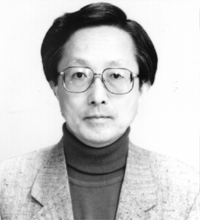
Shuichi Itahashi
ProfessorInstitute of Information Sciences and Electronics,
University of Tsukuba

|
Shuichi ItahashiProfessorInstitute of Information Sciences and Electronics, University of Tsukuba |
| Profile | |
| Affiliation: | Institute of Information Sciences and Electronics, University of Tsukuba |
| Date of birth: | 30 January 1942 |
| Birthplace: | Miyagi Prefecture |
| Background: | |
| 1964 | Graduated in Communications Engineering, Faculty of Engineering, Tohoku University |
| 1970 | Completed doctoral degree in Electrical and Communications Engineering, Graduate School of Engineering Research, Tohoku University |
| 1970 | Research Associate, Research Institute of Electrical Communication, Tohoku University |
| 1972 | Technical Official, Electrotechnical Laboratory, Agency of Industrial Science and Technology |
| 1977-78 | Guest Researcher, Royal Institute of Technology, Stockholm |
| 1982 | Associate Professor, Institute of Information Sciences and Electronics, University of Tsukuba |
I have nearly ten years of experience each at a national university (including my student days), at a national research laboratory, and at my current university. My research topic at Tohoku University involved the use of a lexicon for automatic speech recognition. At the Electrotechnical Laboratory, under the research topics speech analysis and feature extraction, I studied a method for using the human auditory scale as a frequency axis in speech analysis, and modeling temporal changes in the feature parameters of speech. At the University of Tsukuba, I extended my research spectrum to natural language processing and computer graphics, in addition to speech analysis.
In natural language processing, I attempted to apply neural networks to the analysis of Japanese sentences, and am currently dealing with the meaning of "metaphors" in terms of information theory. With regard to computer graphics, I have selected the topic of how to represent vague forms such as flames and clouds, and I have recently been working on the development of the Fireworks CAD system. In the area of speech analysis, I am involved in the temporal structural analysis of spoken dialogues, the classification of Japanese spoken dialects, and the identification of spoken languages.
I started studying dialects while participating in the "Spoken Japanese" Project, one of the Ministry of Education's Priority Area Research projects, conducted over four years, starting in 1989. The project mainly consisted of dialectologists from the humanities, and I was responsible for creating a dialect speech database. Spoken dialects were collected from a hundred districts all over Japan which led me to think of using them myself. Dialects differ not only in their phonemes, but also in accents and intonations. I focused on the difference in accents and intonations to classify spoken dialects, and found that the resultant classification was more successful than I had imagined. Moreover, assuming that dialects and languages could be handled basically in the same way, since their difference arises from social and political influences rather than from their linguistic nature, I applied the same method to the identification of languages, resulting in a similar degree of success.
Needless to say, various speech data are necessary for speech research. The Speech Input/Output Systems Expert Committee of the Japan Electronic Industry Development Association (JEIDA) has been examining and constructing speech databases for nearly ten years. In 1971, the Speech Database Investigation Committee was founded by the Acoustical Society of Japan, and speech databases were selected as one of the research themes in the Ministry of Education's Priority Area Research projects. Speech databases are among the hottest issues throughout the world, along with natural language text databases and image databases.
Regarding the RWC research, as a coordinator of the Speech and Natural Language Understanding Workshop, I have promoted investigation and discussion to find ways of integrating "speech as pattern information and language as symbolic information." However, this is a typical example of "easier said than done." This workshop consists of researchers from both the areas of speech and natural language research. This has sometimes caused misunderstandings to arise; however, we are endeavoring to achieve our goal somehow.
I am also a coordinator of the database workshop, founded last year in RWC. The objective of this workshop is to design and construct three types of databases, namely for speech, text, and images. It is quite natural for an RWC project that deals with the real world to emphasize the database aspect. I hope to continue my research by establishing databases with structures that mirror the real world, and to use them to verify new database methods.